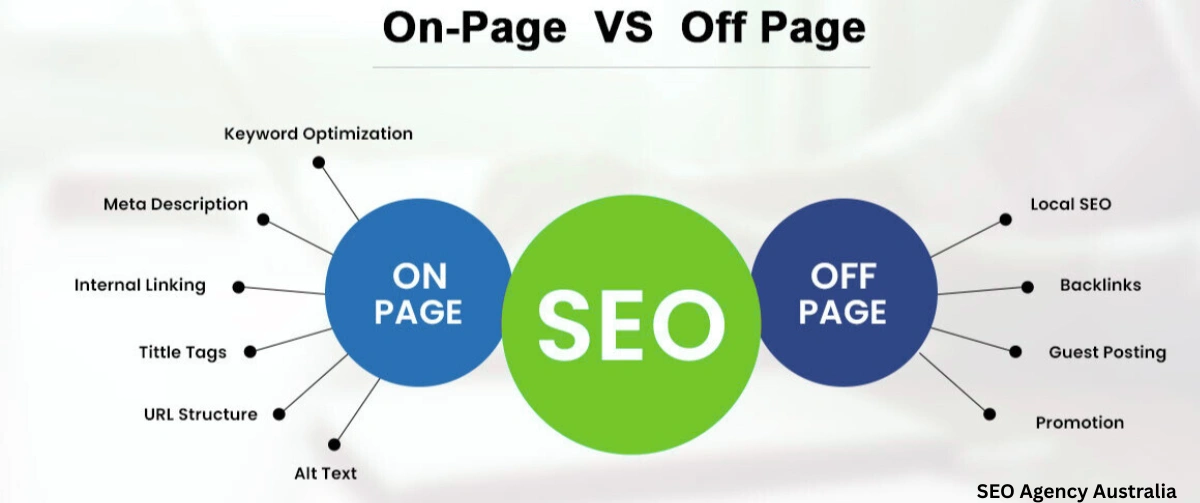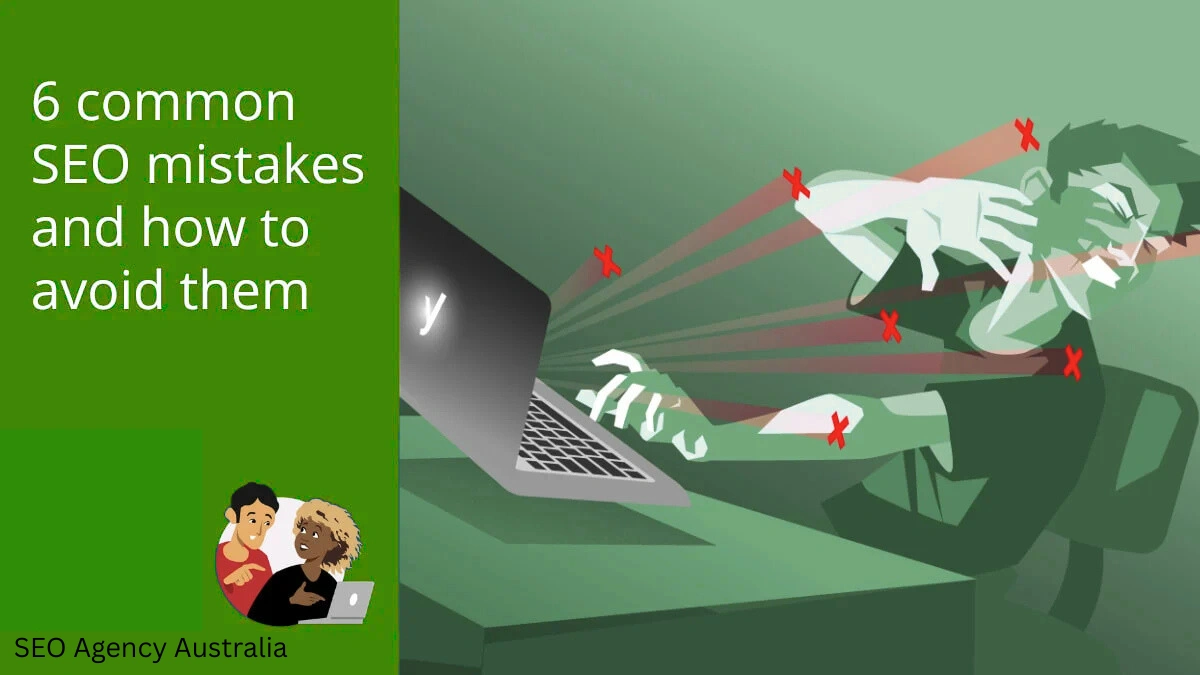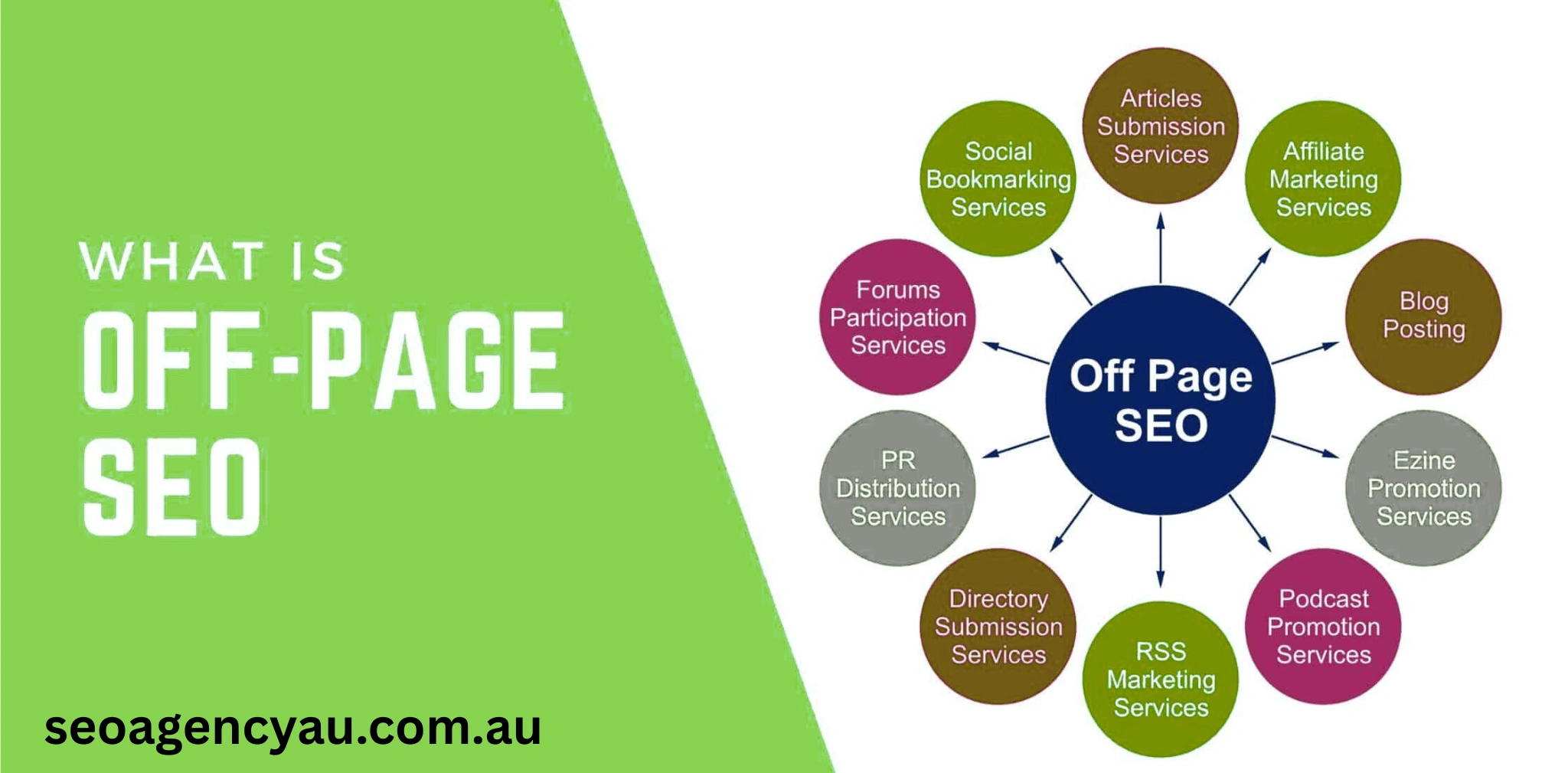You’ve built the perfect website, written killer content, and optimized every page— yet, your site struggles to rank. Why? Because you’re missing the other half of the SEO equation: off-page SEO. In 2025, off-page SEO isn’t just important —it’s essential for credibility, authority, and visibility.
What is Off-Page SEO?
Off-page SEO refers to all the activities you do outside your website to improve its ranking in search engine results. While on-page SEO services are focused on optimizing content on your site, off-page SEO optimization is all about building your site’s reputation, authority, and trust across the web.
Off-page SEO includes:
- Link building
- Social media engagement
- Influencer collaborations
- Brand mentions & citations
- Online PR and reviews
It’s the digital word-of-mouth that tells search engines, “Hey, this site is legit.” In 2025, with so many sites using AI-generated content, trust signals from outside your site have never been more important.
Explain Simply:
- What People Say About You Matters More Than What You Say
Off-page SEO is like people recommending your business behind your back — in a good way. It tells Google:
“Others trust this site. Maybe we should, too.”
- Backlinks = Trust signal
Every backlink is like someone vouching for your reputation.
The more respected the source, the more Google trusts you.
- In 2025, AI Content is Everywhere
Anyone can generate content now.
But not everyone can earn trust, mentions, or links from real people and real websites.
- Google Needs Real-World Proof
Search engines can’t just rely on your own claims.
They want to see:
- “Are others talking about you?”
- “Are you being cited, linked, or mentioned?”
- Off-page SEO Sets You Apart
In a sea of auto-written blogs, off-page SEO techniques show that your site is actually worth rankings, because people outside your site say so.
Off-page SEO is your online reputation, and in 2025, trust is the new ranking factor.
Difference Between On-Page and Off-Page SEO

Understanding the difference between on-page and off-page SEO is crucial if you want a balanced, results-driven SEO strategy.
| On-page SEO | Off-page SEO |
| Content optimization | Link building |
| Meta titles & descriptions | Brand mentions |
| Internal linking | Social signals |
| Image SEO | Influencer outreach |
| Page speed & UX | Domain authority building |
On-page = Tells Google what your site is about.
Off-page = Tell Google why your site should be trusted.
In 2025, SEO on-page and off-page are no longer separate strategies — they are two halves of the same powerful system.
Why Off-Page SEO Now More Than Ever?
As Google’s algorithm becomes smarter and more focused on real-world trust, off-page search engine optimization plays a huge role in rankings.
Why it matters:
- Backlinks from authority sites pass trust and credibility
- Brand mentions reinforce authenticity
- Social engagement derives visibility and sharing
- Google’s E-E-A-T (Experience, Expertise, Authority, Trust) depends heavily on off-page signals
In a world where anyone can generate content, off-page SEO separates the real from the irrelevant.
How to Perform an Off-Page SEO Audit
Before implementing new strategies, run a proper off-page SEO audit to see where you stand.
Key Steps:
- Backlink Profile Review
Use tools like Ahrefs, Semrush, or Moz to analyze:
- Number of backlinks
- Referring Domains
- Anchor text variety
- Follow vs no-follow ratios
- Toxic link detection
Spot and disavow spammy or irrelevant links that can hurt your rankings.
- Brand mention tracking
Use Google Alerts or Mention.com to find unlinked brand mentions.
- Social visibility review
Check your presence on social platforms. Engagement = trust.
Doing a thorough off-page SEO analysis quarterly can drastically improve your backlink health and help guide your strategy.
Top Off-Page SEO Techniques That Work in 2025

Gone are the days of bulk link submissions and spammy directories. Today’s off-page SEO techniques are all about quality, relevance, and trust.
1. High Authority backlinks
Links from trustworthy, niche-relevant websites are SEO gold. Focus on:
- Guest posts
- Editorial mentions
- Contextual in-content links
- Industry roundups
2. Digital PR
Getting mentioned in top media outlets or niche publications helps build brand recognition and high-value links.
3. Influencer Outreach
Micro-influencers can generate backlinks, traffic, and engagement from targeted communities.
4. Unlinked Brand Mentions
Find places where your brand is mentioned but not linked — reach out and request a backlink.
5. Social Media Engagement
While social links are no-follow, engagement and shares create indirect SEO value and drive referral traffic.
6. Forums and Communities
Answering relevant questions on Reddit, Quora, and niche forums can drive organic backlinks and traffic
Content That Naturally Earns Links
The best off-page SEO happens when your content is so good, people want to link to it.
Create:
- Original research and data
- Visual infographics that other want to embed
- Definitive guides that rank for multiple keywords
- Free tools or templates that solve problems
This is passive SEO off-page optimization — links you don’t ask for, because the content does the talking.
How Social Signals Influence Off-Page SEO?
Google has stated social signals aren’t a direct ranking factor, but indirect impact? Huge.
Why Social Media Matters:
- Boost content visibility
- Increase chances of getting backlinks
- Derives real traffic
- Enhances brand awareness
So while off page SEO techniques shouldn’t rely solely on social, ignoring it is a mistake.
Common Off-Page SEO Mistakes to Avoid

Even in 2025, many sites still make rookie errors. Don’t be one of them.
Don’t Buy low-quality backlinks
They may give a temporary boost, but long-term damage is guaranteed.
Don’t over-optimize anchor text
Too many “exact match” keywords in links can trigger Google penalties.
Don’t ignore brand mentions
Unlinked brand mentions are an opportunity — use them.
Not updating link-building strategies
What worked in 2015 won’t work now. Stay current.
What Makes a Backlink Valuable?
Not all backlinks are created equal. When planning your off-page SEO strategy, aim for quality, not quantity.
What matters:
- Relevance: Same niche or topic
- Authority: Domain strength of the linking site
- Placement: In content links are better than footer
- Diversity: Mix of domains, types, and anchors
- Traffic: Link from traffic-heavy sites = more clicks
Focus on off page SEO optimization that builds links organically and ethically.
Integrating Off Page SEO with On Page Strategy
The best SEO campaigns don’t treat on-page and off-page separately.
Here’s how to combine both:
-
Start with great on-page content
Keyword-rich, valuable, and optimized for search engines.
-
Promote that content off-site
Share it with influencers, promote it on social media, and build links to it.
-
Track performance together
Use tools to monitor which content earns backlinks and which does not.
A smart SEO understands content derives links, and links amplify content.
Off-Page SEO in 2025 and Beyond
The digital world is changing fast, but one thing stays the same: Google trusts what others say about you more than what you say about yourself.
Off-page SEO is how you earn that trust. It’s not about gaming the system — it’s about building relationships, delivering value, and earning your place in the SERPs.
In 2025, SEO is no longer a game of shortcuts. It’s about:
- Authenticity
- Relevance
- Authority
- Trust
And off-page SEO is the foundation of all four.
FAQs For Off-page Optimization
1. What is off-page SEO, and why is it important in 2025?
Off-page SEO refers to all the strategies and actions performed outside your website to improve its search engine rankings. It includes link building, brand mentions, social signals, and influencer outreach. While on-page SEO focuses on your website content and structure, off-page SEO optimization builds your domain authority and online reputation.
In 2025, with search engines placing more value on trust and authenticity, off-page search engine optimization has become more important than ever. It helps Google recognize that your site is recommended by others, which is a strong signal for higher rankings.
2. What are the most effective off page SEO techniques to improve rankings?
There are several link-building strategies that continue to deliver excellent results in 2025. These include:
- High authority backlinks from niche website
- Guest blogging on reputable platforms
- Influencer collaborations for content mentions
- Digital PR and brand mentions
- Social media engagement and forum participation
- Citations and local directories for location-based SEO
These off page SEO techniques help build a trustworthy, authoritative online presence that search engines respect.
3. How is off-page SEO different from on-page SEO?
The difference between on-page and off-page SEO lies in where the optimization takes place.
- On-page SEO happens within your website: optimizing content, meta tags, headings, internal links, and technical structure.
- Off-page SEO, on the other hand, includes external efforts: earning backlinks, getting reviews, social sharing, and influencer endorsement.
Both are essential for a complete SEO strategy. Off-page SEO and on-page SEO should work together to improve visibility, drive organic traffic, and establish credibility in your industry.
4. What should be included in an off-page SEO audit?
An off page SEO audit is an important step to understand your current backlink profile and off-site authority. It includes:
-
- Backlink analysis: Total links, referring domains, and link diversity
- Anchor text audit: Balanced use of branded, generic, and keyword-rich anchors
- Toxic link detection: Identify and disavow spammy links
- Social signal review: Examine brand engagement and shares
- Brand mentions: Track unlinked and linked mentions across the web
- Domain authority tracking: Measures your site’s reputation over time
5. For what purposes does an off-page SEO audit help?
A proper off-page SEO audit helps you refine your outreach and link-building strategies, ensuring you only build relationships with trustworthy and relevant sources.
6. What are the benefits of off-page SEO for long-term growth?
The benefits of off-page SEO go far beyond just getting backlinks. In fact, a strong off-page strategy directly supports long-term business growth by:
- Increasing your website’s domain authority
- Driving consistent referral traffic
- Enhancing brand trust and recognition
- Improving search engine ranking across multiple keywords
- Establishing thought leadership in your niche
7. What should I invest in: off-page SEO or paid ads?
By investing in off-page SEO services and ethical link-building practices, you create a sustainable online presence that does not rely on paid ads or short-term tricks. In a competitive digital space, SEO trust signals give you the authority and visibility needed to outshine competitors
8. Do we really need off-page SEO services in 2025?
In 2025, with Google heavily relying on external trust signals, investing in reliable off-page SEO services is no longer optional — it’s essential for staying competitive. These services help you build credibility, drive referral traffic, and boost rankings without relying solely on paid ads.
Whether you are a local business, SaaS brand, or e-commerce store, off-page SEO is your ticket to long-term organic growth.



